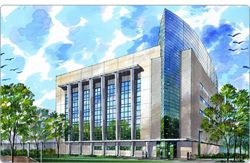Why Here? Why Now?
First of seven educational community forums on NEIDL being held tonight

When Glen Berkowitz first heard that a laboratory for the study of the most serious infectious diseases could be built in his South End neighborhood, he realized that it was the most controversial issue to hit his community in 10 years.
“I wanted to see if I could do anything to help reduce the concerns that my neighbors had about the fact that the BioLab was happening,” says Berkowitz, a member of the Worcester Square Area Neighborhood Association, “and then make sure that their concerns were heard by the people who were going to build and operate the BioLab.”
Boston University Medical Center (BUMC) was awarded a grant in 2003 from the National Institutes of Health to build the National Emerging Infectious Diseases Laboratories (NEIDL), formerly known as the Biosafety Lab, at the medical center. The facility, currently under construction on Albany Street, will research dangerous infectious diseases, whether they occur naturally or are introduced through bioterrorism, and develop diagnostic tests, treatments, and vaccines. Construction is slated for completion in 2008.
Berkowitz decided to apply for a position on the six-member Community Liaison Committee (CLC) created by BUMC to make sure residents have access to information about the laboratory and to help facilitate communication between NEIDL and the community. The committee, which Berkowitz chairs, has planned seven public forums, each on a different topic and featuring a NEIDL representative. The first meeting takes place tonight, June 25, at 7 p.m. at Boston’s Cathedral High School. Susan Ryan-Vollmar, editor of Bay Windows and the South End News, will moderate the discussion.
“In some respects,” says Berkowitz, “we feel this is the first set of meetings ever to take place on the BioLab in which the people who are designing and who will operate the lab will actually have a two-way conversation with citizens and others who are interested in, and in some cases concerned about, the BioLab.”
Each forum will address a predetermined set of questions. Tonight’s forum focuses on the question, why here, why now? The remaining forums will take place about once a month through December and cover what will be studied at NEIDL, what risks are involved in the work, what the emergency response plans are, and how the community will benefit from the facility.
NEIDL will employ 150 scientists and researchers, including Horacio Frydman, who is coming to BU from Princeton, where he has been an associate research scholar in the lab of Nobel laureate Eric Wieschaus. Frydman also will join the biology faculty at the College of Arts and Sciences, splitting his time between teaching a graduate level course on the biology of stem cells and researching the effects of the infectious bacteria Wolbachia on stem cells in fruit flies.
“Hopefully we can all learn from each other and see if, through education, we can reach a better community-wide understanding of what the benefits of the BioLab are,” Berkowitz says, “as well as what the concerns might be from its operation, both on the workers and residents in the neighborhood, so that a BioLab that operates here is one that could do both wonderful science as well as be an accepted, if not a welcomed, part of our neighborhood and city.”
The Community Liaison Committee’s first public forum about the National Emerging Infectious Diseases Laboratories under construction at Boston University Medical Center will take place tonight, June 25, at 7 p.m. in the gymnasium at Cathedral High School, 1336 Washington St., Boston. The event is open to the public. Questions and concerns may be submitted to the CLC at clcmembers@hotmail.com.
Nicole Laskowski can be reached at nicolel@bu.edu.